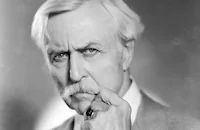The Beachcomber
Brief Synopsis
Cast & Crew
Hobart Bosworth
Helen Wolcott
Mr. Rahawanaku
Mrs. Drew
John Weiss
W. F. Harrison
Film Details
Technical Specs

Synopsis
Raised by a religious mother, a boy grows up at sea and, after growing to adulthood, is washed overboard one day in a storm. He is rescued by a Hawaiian named Kane Pili, whose blood brother the sailor becomes after the islanders nurse him back to health. Tempted by the love of Kane Pili's sister Taleaa and by the easy life on the island, the sailor is about to abandon the ways of civilization and become a beachcomber when a message in a bottle from a lost whaling ship revives his childhood religiosity. Taleaa, angry at the sailor's rejection of her advances, frames him for the desecration of an idol but intervenes to save his life at the last minute. The sailor leaves the island and takes up residence in a Christian community, eventually returning to bring Kane Pili and Taleaa back with him and to marry Taleaa.

Cast

Hobart Bosworth
Helen Wolcott
Mr. Rahawanaku
Mrs. Drew
John Weiss
W. F. Harrison
J. Harvey
Dan Waid
Rhea Haines
Mr. Stedman

Film Details
Technical Specs

Quotes
Trivia
Notes
Bosworth, Inc. began production on this project, but it is unclear whether the film was ever completed or exhibited. Evidence indicates that the film was produced in 1915. Cast credits have been taken from handwritten notes on a production sheet in the Paramount studio records, and exact spellings for some of the names, particularly Mr. Rahawanaku, cannot be determined. Mrs. Drew is probably the actress Cora Drew, who worked for Bosworth, and Mr. Stedman is probably Marshall Stedman. The production notes give the name of the actor playing the sailor as a child as "Antrim," which is possibly a reference to the child actor Antrim Short. A modern source credits Phil Rosen, not Gus C. Peterson, as the film's cinematographer. No contemporary reviews or news items for the film have been located.












